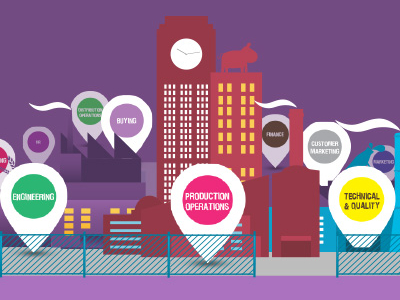What’s it all about then?
As a project engineer working in the food manufacturing sector your job is to make sure that all project work is completed on schedule and within budget; this could be capital projects such as purchase and installation of new equipment through to improvement work that you may be involved with.
You’ll be the manager for the entire project from initial conception, through design, purchase and installation, to final commissioning and sign off.
You’ll have to balance a whole range of factors in order to get your projects completed with a minimum of disruption to your company’s activities.
What might I be doing?
This varies from company to company but should include:
- Designing, installing and commissioning new equipment
- Developing project costs and schedules
- Presenting concepts to senior management
- Ensuring project buy in from different affected departments
- Making sure all projects run to budget
- Checking out new technologies and equipment
- Liaising with suppliers and contractors
- Ensuring successful commissioning of equipment
- Writing evaluative reports and suggesting improvements
- Investigating potential process improvement projects
- Leading a team of specialists if required
- Managing multiple projects at any time
- Updating relevant senior management on progress
- Anticipating and resolving issues
What will be expected of me?
You’ll need to be well organised to stay on top of your projects as you may have multiple work streams at any one time; the pressurised nature of the work means you’re going to have to remain calm at all times so that you can focus on solving problems as they arise, which is an inevitable part of the job.
You’ll be expected to have a lot of initiative and drive which will ensure that you get the job done properly and to budget.
You’ll be expected to be an expert on any legal and technical issues surrounding your project so that you can make the right decision when called upon to do so.
Of course you’ll be a real people person because you’ll spend a lot of time meeting with different people and you’ll be negotiating with them and getting them to accept your proposals.
What can I expect?
Most of the time you’ll work a 37.5 hour week with somewhere between 8am and 6pm but this will increase and change dramatically when you’re approaching the deadline for completing a project.
You will also get a lot of travel in this role as many equipment manufacturers are located away from where you work.
What qualifications do I need to get in?
This is not an entry level job in most instances and you will likely have to have some experience under your belt before you consider the role.
Engineering has loads of entry points from Apprenticeships through to postgraduate qualifications and you can study for these at both FE colleges and the local universities.
What about further training?
Again there are loads of qualifications and training options available to you as an engineer; you may take specialist courses which help you do your job better or you may want to consider masters level qualifications which might be related to your work, or which give you a broader base of management and leadership knowledge
You could also consider membership of professional bodies, many of which have their own qualifications and all of which will help you with your continuous professional development (CPD).
Anything else I might need to know?
Yes, you’re not going to be bored in this job as there will always be projects that need to be delivered and improvements that need to be made!
When you do well at this you’ll also be able to kick on and take your career to the next stage.
 cy
cy





